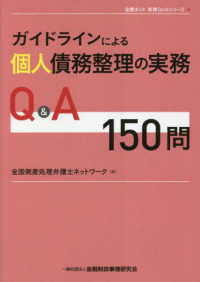- ホーム
- > 洋書
- > ドイツ書
- > Humanities, Arts & Music
- > Psychology
- > practical psychology
Full Description
This open access book aims to show how creative ruptions - disturbances or commotions - can lead to the emergence of ethical, care-ful educational futures. Grounded in empirical and theoretical research undertaken from posthuman, decolonial, new materialist and feminist perspectives, this edited volume questions historical and current assumptions as to how education is structured and enacted, and provides examples and tools illustrating how to create and work with creative ruptions. Under the guidance of an experienced editorial team, the authors demonstrate how creative ruptions can respond to various wicked problems through the design and enactment of transformative pedagogies and accompanying research. Including consideration of how we can grow our emotional repertoires from anxiety to include hope and courage, the book explores how creativity might expand the horizons of personal, social and political possibility that take shape within - and ultimately determine - education and its futures.
Offering theoretically driven and practically grounded transdisciplinary examples of alternative educational futures, this volume is an ideal reading for those interested in the intersecting fields of Possibilities Studies in Education, Creativity in Education, Educational Futures, Pedagogy, and related disciplines.
Contents
1.Creating Spaces for Ruptions and Provocations.- Part 1: Creating Spaces for Ruptions.- 2. Flowing with embodiment and materiality: touch and time for new educational futures.- 3. Exploring aeshoecology - affective anticipation, liminality and emergence as features of alternative educational futures.- 4. On bewilderment, education and opening spaces for creativity and emergent educational futures.- Part 2: Dialoguing.- 5. Journeying with affective embodied empathy for an ethical understanding of environmental education.- 6. (Ma)kin(g) sympoetic more-than-human educational futures.- 7. Sensing in liminal spaces: Words, music and dementia.- 8. Creativity in an emergent and improvisational global educational environment.- Part 3: Resistings.- 9. The aesthetics of African participatory music making through the eyes of Utu: An alternative approach to music education.- 10. Re-imagining research methods curriculum in education otherwise: A decolonial turn.- 11. Care as resistance within educational practice.- 12. Steps toward a decolonial feminist ecology.- 13. Conclusion: Inhabiting the cracks: Accumulating creative ruptions to change education
-

- 電子書籍
- この夜が終わるまで【分冊】 1巻 ハー…
-

- 電子書籍
- 女たちの禁断の告白~痴漢願望~






